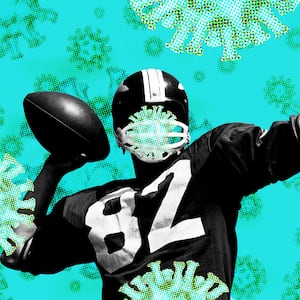Whatever else is taught at Iowa State, the school itself is imparting a lesson in reprehensible recklessness as it prepares to allow 25,000 to attend a football game even as its home city of Ames has become the hottest COVD-19 hotspot in America.
The Iowa State Cyclones will start the season ranked 23rd in the nation, but the university can boast “We’re Number 1! We're Number 1!” in irresponsibility.
The university will be ignoring a written plea from the board of health of Story County, which encompasses Ames.
“We strongly recommend that Iowa State University prohibit spectators at sporting events this fall,” the board told the school back in June. “Please only broadcast them. We cannot think of any way these events can be made even remotely safe with the masses of people from throughout Iowa, and other states, who routinely attend these events. Please do it for the health of our community.”
The board noted that the Iowa State Fair had decided to cancel its annual mass gathering in Des Moines. The attitude reflected by the announcement the fair posted online should serve as a guide for all of us in this pandemic.
“For your safety, we have made the difficult decision to postpone the 2020 Iowa state fair. We want you to have a safe and healthy summer so that we can bring back Iowa’s biggest and grandest tradition and be together Aug. 12-22, 2021 at the Iowa State Fair.”
The Story County Health Board’s chairman, Dr. John Paschen, hoped aloud that Iowa State University would follow the fair’s example. He is aware that many schools have postponed football games altogether and indeed much of the world is holding sports events in empty stadiums. But Iowa State remains determined to go ahead with its plan even though the school’s positivity rate in COVID-19 tests doubled from an already alarming 13.6 percent during the first week of classes to 28.8 percent in the second.
“I would call it irresponsible,” Paschen told The Daily Beast on Tuesday. “We’re talking about are you on the side of Mr. Death or you against Mr. Death?”
The game is scheduled for Sept. 12, one day after the 19th anniversary of 9/11, when Mr. Death claimed almost 3,000. Mr. Death has claimed more than 183,000 Americans in the current pandemic, with many more all but sure to come. A football game is not worth even one added fatality.
Paschen noted that Iowa State is observing the board's recommendation to make masks mandatory. And, less than half of the stadium’s capacity of 60,000 willd be filled. But that is still a huge gathering to supervise in the midst of an outbreak.
“I don’t know how many people they are going to have to keep this crowd of 25,000 doing what’s right,” he said.
He noted that the seating plans still placed large groups together.
“They will not keep people 6 feet apart,” Paschen sad. “There will be people screaming and yelling because this is a sporting event.”
That means there will be the proven danger of virus-carrying droplets among people coming from all over Iowa, and even out of state. Paschen noted that those who have COVID-19 will bring it to the stadium, and those who catch it there will be taking it to their home communities.
“This is not the time to have this kind of event,” he said.
Of the precautions the university says it will be taking at the game, he added, “I don’t think it’s enough. I really honestly do not. I really hope they change their mind.”
On Monday, Iowa State Athletic director Jame Pollard defended what is essentially a decision against medical advice.
“If we can make it happen, it could be an incredible success story,” Pollard said at a press conference. “And if it can’t, if it just ends up being for whatever reason— lack of compliance, our mitigation strategies just don’t work—then we’ve got to pull the plug, but I’ll know we tried.”
He added that the university is “hoping we can continue to thread that needle in what I call a 'conservative but aggressive' approach. I get it. Having fans is aggressive, but I think we’re approaching it in a conservative way with the mitigations that we’ve put in place.”
Pollard stated back in June that he would “take my lead” from Iowa State’s president, Wendy Wintersteen. She is an entomologist who has specialized on the impact of insects and insecticides on crops, writing her thesis on Malathion in grains. She knows enough about pests to have a better sense of pestilence than the average citizen and she might be expected to respect the views of her fellow scientists. But she is offering little public comment about the game and did not respond to a query from The Daily Beast.
Actions speak louder than words, and even if she utters not another syllable about it, Wintersteen will be disgracing herself as both a scientist and an educator if Iowa State goes ahead with the plan to have thousands of spectator at the game versus the Louisiana Lafayette Ragin’ Cajuns at Jack Trice Stadium on Sept. 12. She will also be betraying the remarkable spirit of solidarity and decency that Iowa State displayed as a whole back in 1923, following the death of the football player for which Trice Stadium is named.
Jack Trice was the first Black athlete at Iowa State. His first big game was an away contest against the University of Minnesota in Minneapolis. He was allowed to stay in the hotel with his teammates the night before, but the dining room was whites only, and he had to eat alone in his room. A note he wrote either to himself or his family would later be found in his suit.
<p><em>My thoughts just before the first real college game of my life: The honor of my race, family & self is at stake. Everyone is expecting me to do big things. I will! My whole body and soul are to be thrown recklessly about the field tomorrow. Every time the ball is snapped, I will be trying to do more than my part. On all defensive plays I must break through the opponents' line and stop the play in their territory. Beware of mass interference. Fight low, with your eyes open and toward the play. Watch out for crossbucks and reverse end runs. Be on your toes every minute if you expect to make good. Jack.</em></p>
Some of his teammates would later say that the opposition targeted Trice on the field because of his race. His collarbone was broken in the second play of the game. He was still playing in the third quarter, when he ended up on his back after trying to stop an opposing ball carrier. His injury kept him from rolling protectvely onto his stomach as three Minnesota players stomped him in what some observers later said amounted to manslaughter if not murder. He insisted he was fine, but was unable to rise and had to be carried from the field. He was transported by train on a straw mattress back to Ames. He died of internal injuries two days later.
At 3 p.m., the following day, all of Iowa State stopped for the rest of the day in tribute to Trice. Some 4,000 students and faculty attended his funeral, where his coffin was covered with the school colors, cardinal red and gold. Iowa State did not play Minnesota again for 66 years, until 1989.
Thrice’s final note about seeking to do big things and throwing his whole body and soul recklessly about the field and trying to do more than his part every time the ball is snapped is filled with the same spirit that drives Iowa State football to go ahead and play despite the pandmeic. But all that is equally possible in an empty stadium. And to be reckless with the well-being of others runs contrary to the nobility Trice displayed and the entire university honored.
Most particularly when the issue of racial justice joins the pandemic in a double challenge to our country, the university that once did right by Trice should now do right by all of us in the stadium named after him. The university would be taking a stand against Mr. Death and doing its part every time the ball is snapped in an empty stadium.
“We have to be on watch for [COVID-19] at all times until we have a vaccine and get this under control,” Paschen said.
He set a modest example of how we should conduct ourselves when he canceled the annual luau he usually holds for up to 100 people the weekend before classes start at the university.
“We put a pig in the ground and everything,” he told The Daily Beast. “It’s really quite a deal.”
Then came words such as he still hopes the university will say about its plan to have thousands of spectators at a football game.
“Not this year.”




